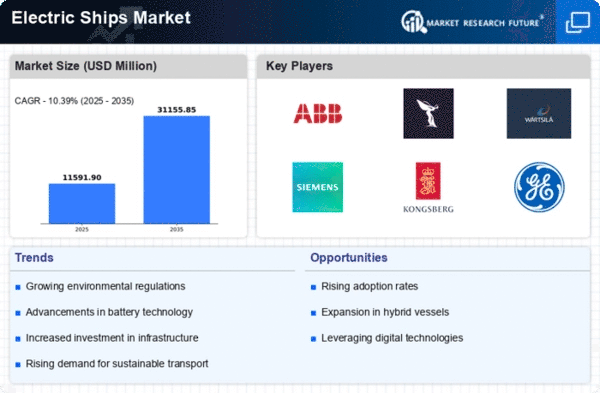Market Trends
Key Emerging Trends in the Electric Ships Market
The market for electric ships is undergoing revolutionary changes that highlight the marine sector's transition to greener and more sustainable alternatives. According to the market overview, the development of electric ships is being fueled by a number of important factors. The increasing focus on electrification for engines is one of the key developments in the market for electric ships. As the maritime industry strives for decarbonization and environmental consciousness increases, ship builders and drivers are looking to electric power as a practical substitute for conventional fuel-driven systems. Electric propulsion systems are a desirable option for shipowners trying to comply with strict environmental rules since they lower greenhouse gas emissions and enhance energy efficiency. In the market for electric ships, the use of energy storage devices—especially sophisticated batteries—is also a key trend. Increasingly lightweight and high-capacity battery technology have made it possible for electrical vessels to preserve and utilize power effectively. These batteries serve as a dependable and adaptable energy source for a range of ship operations in addition to powering the electric propulsion systems. Electric ships are growing more practical for longer voyages and a greater variety of nautical uses as technology develops.
Electric ships are increasingly integrating smart and autonomous systems in alongside propulsion and energy storage. In the maritime sector, automation is becoming more and more important since it improves operating efficiency, navigation, and collision avoidance. With the help of these technologies, electric ships can create safer, more intelligent, and environmentally friendly ships. An important step regarding the future of marine transportation is the integration of autonomous characteristics and electric propulsion. The growing funding and assistance for studies and development within the field of electric ships is another significant trend. Governments, business participants, and environmental groups are realizing that electric propulsion has the potential to lower the carbon footprint of the maritime sector. As a result, there is a notable increase in financial support and cooperative endeavors directed towards the progression of electric ship technologies, promotion of innovation, and establishment of a wider market acceptance of sustainable marine solutions.
Additionally, the market for electric ships is seeing a change in the methods used in ship development and building. Lightweight materials and cutting-edge designs are being used by shipbuilders to maximize the effectiveness of electrical propulsion systems. Not only is the environmental impact to be minimized, but the overall efficiency and economy of electric ships are also being prioritized. Ship owners wishing to purchase contemporary, environmentally friendly vessels find the market to be more competitive and appealing as a result of these design innovations. In summary, the market for electric ships is undergoing revolutionary changes that demonstrate the marine sector's dedication to innovation and environmental sustainability. Among the major factors influencing the market are the move toward electric propulsion, the uptake of sophisticated systems for storing energy, the incorporation of intelligent and autonomous technology, higher R&D expenditures, and creative ship design techniques. The market for electric ships is set to develop as the need for greener and more effective marine solutions grows. This presents potential for stakeholders to help ensure an environmentally friendly future for the shipping sector globally.


















Leave a Comment